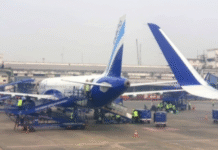New Delhi– India’s domestic passenger traffic grew by 26.2 per cent in July, a global airlines’ association said on Wednesday.
“China and India are booming while more mature markets are stuck in neutral, and Brazil and Russia are sliding backwards,” the International Air Transport Association (IATA) said in its global passenger traffic data for July.
According to the data, India’s domestic revenue passenger kilometres (RPK) and available seat kilometres (ASK) were the highest amongst the major aviation markets such as Australia, Brazil, China, Japan, the Russian Federation and the US.
The global airlines association’s data showed that India’s domestic RPK — a gauge that measures actual passenger traffic — rose by 26.2 per cent in July compared to the corresponding month of the previous year.
The July data disclosed that India’s domestic passenger traffic growth was followed by that of China at 10.2 per cent, the US at 1.6 per cent, Japan at 0.9 per cent and Australia at 0.2 per cent.
However, Brazil reported a decline in its domestic passenger traffic at 6.8 per cent and the Russian Federation at 3.2 per cent.
Further, India’s domestic ASK — which measures available passenger capacity — surged by 20.5 per cent in the month under review, followed by that of China at 9.7 per cent and the US at 3.1 per cent.
In addition, the global airlines association said the global RPK in July rose by 5.9 per cent, while the ASK climbed by six per cent.
The international passenger demand for July rose 7.1 per cent compared to July 2015, which was an increase over the five per cent yearly increase in June.
According to Alexandre de Juniac, Director General and Chief Executive, IATA, after a softening in June, July saw demand strengthen as it was stimulated by lower fares.
“Demand was stimulated by lower fares which, in turn, were supported by lower oil prices. Near record high load factors demonstrate that people want to travel. But, there are some important sub-plots to the narrative of strong demand,” said Juniac.
“Long-haul travel to Europe, for example, suffered in the aftermath of a spate of terrorist attacks. And the mature domestic markets are seeing demand growth stall while Brazil and Russia contract.”






